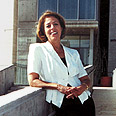
Ten years ago, a Palestinian man from Gaza met Prof. Rivka Carmi, now dean of the Health Sciences Faculty at Ben-Gurion University, about his daughter’s rare disease.
Over the years, Carmi developed a special relationship with this family until the current conflict disrupted it. Carmi, 56, recalls the days when the young Palestinian girl was able to travel back and forth to her clinic to undergo various diagnostic tests.
“Now she is probably 13 or 14 years old and she needs an operation that cannot be performed in Gaza, and this upsets me, because I know that we can help her here," Carmi said.
Just until two months ago, the father was in touch with Carmi. But for unknown reasons, she stopped hearing from him.
“When I call the number the father gave me I get no answer. I don’t know what is happening with them; I am very worried,” Carmi said. “I am not able to implement my capabilities to help somebody else. This conflict has impaired my abilities to practice my profession.”
Born in Zichron Yaakov, Carmi has excelled in her professional life. After graduating from Hebrew University Hadassah Medical School in Jerusalem, she moved to Beer Sheva in the Negev before going to the U.S. for her training in medical genetics. She moved back to Israel, where she became the head of the Genetics Institute at Soroka Medical Center in Beer Sheva.
Cooperation for years
Five years ago she was elected to be dean of the Faculty of Health Sciences at Ben-Gurion University. She also serves as head of the Medical Deans Association in Israel.
For many years, cooperation between Palestinian and Israeli doctors was part of Carmi’s daily life, but the eruption of the conflict four and a half years ago ended everything.
"Up until five years ago, we had a lot of research cooperation which ended completely because of the conflict. We also had medical relations; we used to go to Gaza to give consultations," she says.
Carmi believes that the lack of cooperation is a result of technical problems arising from the conflict.
“The lack of cooperation is mainly technical, because whenever something huge happens, the atmosphere is emotionally poor for research. But even on a daily basis when we don’t have something dramatic going, we can’t move from one place to the other and this is very disturbing,” she says.
To try and maintain contact with her Palestinian colleagues, Carmi spoke on the phone and communicated via e-mail, and sometimes met with them outside the country.
New relations give hope
“You can call and write emails a certain extent, but cooperation is about meeting together and sitting in the same room and talking about things in general. And this was technically not possible for a very long time,” she says.
For Carmi, both the Palestinians and Israelis are paying the price.
“People cannot get the appropriate treatment, and in research we are not making as much progress as we could,” she says.
The new relations emerging between the Palestinians and Israelis to in the recent months give her hope.
“I'm very happy to tell you that things are improving now. Just recently I met two physicians from the West Bank. We will start cooperating on research projects together,” she says. “There are many similarities between our neighborhood in the Negev and their community in the West Bank. For example, intermarriage is a problem among the Beduin families in the Negev, as well as communities in Palestine, so we have common goals both in research and in health services.”
Carmi hopes to see the medical school in Al-Quds University in Jerusalem eventually recognized.
“Israel does not officially recognize Al-Quds University and because of that, students don’t have the opportunity to use the facilities in Israel. We are trying hard to overcome this barrier, but unfortunately this will only get better when the conflict will be over and the Palestinian state will be established,” she says.
For Carmi, leaders can make decisions, but it’s the people who bring it to reality.
“Leaders can sign agreements, but if people don’t cooperate, nothing will happen. We may have it on paper but not on the ground,” she says.
Daily life doesn’t feel normal under the conditions of the conflict for Carmi.
“The conflict is like a big cloud on our life; I feel it the most when I travel outside Israel, where I don’t have to hear what’s going on on the radio all the time and people are living normal lives,” she says. “Only then I realize how much we are deeply occupied and affected by this conflict.”
Article printed with permission of 'Bridges,' an Israeli-Palestinian public health magazine sponsored by World Health Organization. Bridges is written, edited, produced and managed by Palestinian and Israeli academics and health professionals. Contact 'Bridges' at bridges@who-health.org















